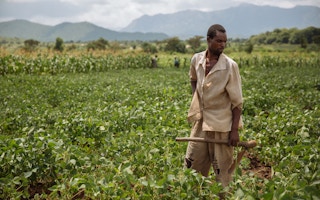What is going on?
Doughnuts are getting more expensive—this is a sentence none of us are happy to hear.
As the demand for vegetable oil soars, soybean farmers are deciding whether to sell their products for food or biofuel production. But the choice is becoming clear with biofuel producers emerging as the highest bidders.
With food and fuel competing for vegetable oil, “it’s become the diesel vs doughnuts debate” as put by agricultural economist David Widmar. Indeed, Krispy Kreme recently stated that commodity price pressure is the reason why our next doughnut purchase will be more expensive.
While donut price volatility might sound amusing, the wider implication of this is more alarming. Last year, the number of people facing hunger due to economic shocks (perpetuated by the pandemic) jumped by 70 per cent to US$40.5 million, bringing the total number of hunger-affected people to 142 million globally.
Gambling with the prices of basic foods could have grave consequences, affecting low-income populations, who already face rising inflation and energy costs, while still recovering from the pandemic.
Simply put, if you had 100 kg of soybeans, would you use it to feed a village or to produce biofuel in a bid to reduce emissions? The answer is not that easy.
Why is this happening?
The global climate change fight led to the popularisation of biofuels—fuels based on ethanol (e.g. sugar cane, rice, or potato skins) or biomass (e.g. vegetable oils, fats). Biofuels are fully biodegradable and cleaner, producing less greenhouse gas emissions compared to their high-polluting counterparts such as diesel or pure gasoline.
With companies and countries setting ambitious net-zero targets and cities increasingly focusing on clean air, biofuels present an attractive way to rapidly reduce pollution. For example, cellulosic ethanol has the potential to cut emissions by up to 86 per cent.
Does it sound too good to be true? Well yes, there is a dark side to biofuels since their production diverts feedstock from food. In turn, this can lead to higher crop prices and potentially threaten food security in some regions.
Not to mention, the environmental impact of industrial-scale agriculture which is often linked to issues such as deforestation, the overuse of fertilisers, monocultures (i.e. prioritising one crop), inefficient water uses and subsidies politics.
The EU recognises such challenges and in 2015 capped the use of crop-based biofuel in the transport sector at 7 per cent. However, this limit is under review as significant decarbonisation efforts are required to meet the EU’s target of climate neutrality by 2050. What we see here is a textbook ESG example of balancing environmental and social outcomes. So which one do we prioritise?
What is the message here?
Biofuels are not the long-term solution to the pollution problem. Whilst they are cleaner, they are still used for combustion engines. With the EU signalling the end of internal combustion engines and the UK banning the sale of new petrol and diesel cars by 2030, the trend points to alternative ways of supporting mobility.
There are promising developments around electric vehicles and hydrogen fuel station infrastructure, sparking hope of pollution-free transport. However, we also encounter environmental challenges—remember the Tesla batteries?
It’s likely that the future of mobility lies within a healthy mix of strengthening public transport infrastructure (e.g. trains, buses, tube), self-driving vehicles, hydrogen/electric powered cars and the use of biofuel, for example in aviation.
For now, we need to remember our climate change fight while remaining mindful of how food price fluctuations impact economically vulnerable communities.
Now go and get a doughnut before they become too expensive!
Arabesque is a global group of financial technology companies offering sustainable investment, advisory, and data services through advanced ESG and AI capabilities.









